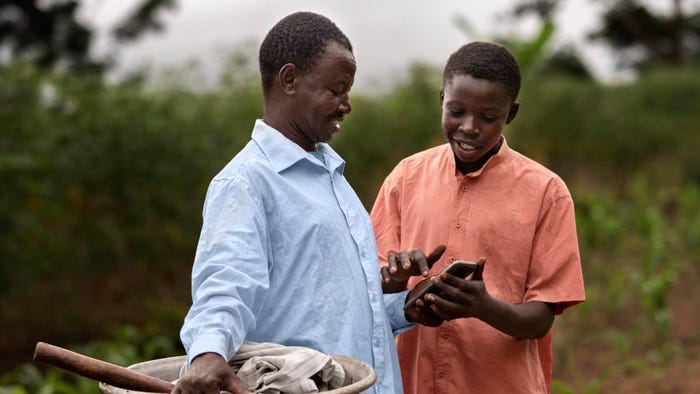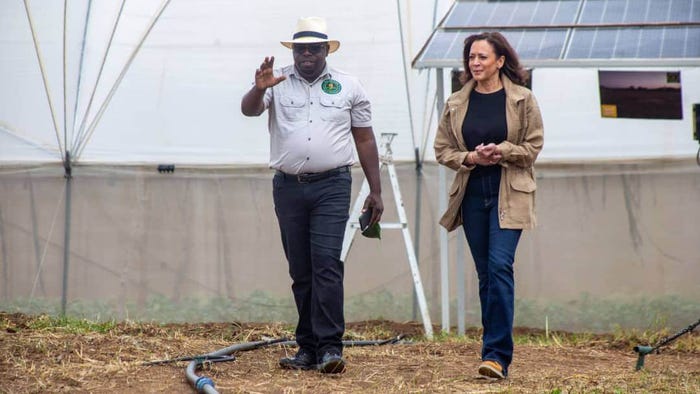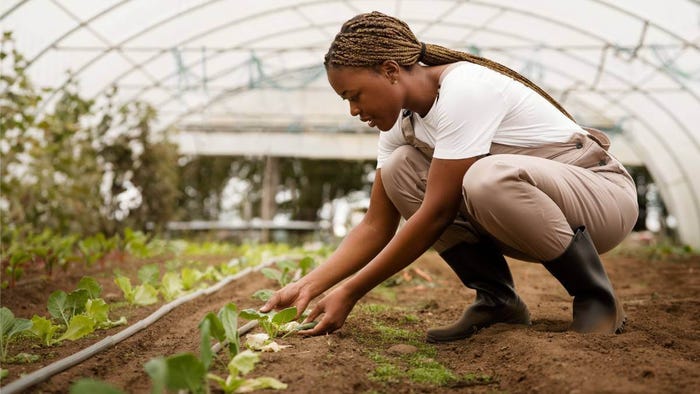Agritech's role in mitigating climate risk in AfricaAgritech's role in mitigating climate risk in Africa
Agritech is gaining traction across Africa as a means of promoting food security, protecting farmer incomes, and supporting the sustainable development of a rapidly expanding continent.

In recent decades, African countries have seen a rise in climate events which are negatively impacting agricultural output.
This has contributed to a 34% decline in the region's agricultural productivity since 1961 – higher than any other continent, according to Sisonke Mgwebi, consulting analyst at Frost and Sullivan.
According to the World Economic Forum, agriculture accounts for 35% of Africa's GDP and provides employment for half of its people.
A continent battling multiple climate risks
In 2023 alone, the Horn of Africa has been blighted by an ongoing drought impacting the farming seasons in Ethiopia, Kenya, and Somalia.
Meanwhile, from February 5 to March 15, 2023, the longest running cyclone on record – Cyclone Freddy – battered Southern Africa with Madagascar, Malawi and Mozambique emerging the hardest hit.
In Mozambique the cyclone damaged 92,000 hectares of crops. This comes as the country is still recovering from the impact of Cyclone Idai which hit in 2020. In Malawi, Cyclone Freddy damaged over 179,000 hectares of agricultural land, impacting two million farmers.

According to the World Economic Forum, agriculture accounts for 35% of Africa's GDP and provides employment for half of its people. (Source: Image by Freepik).
Mwasilwa Ambali, a Benin-based climate resilience expert qualifies that climate risks are not homogenous across the continent, with regions being affected differently owing to their varying soils, weather patterns, and temperatures.
However, droughts, crop pests and diseases, and storms are some of the main climate risks affecting farmers in Africa.
Agritech as a response
Agricultural technologies (agritech) are gaining traction as a means of promoting food security, protecting farmer incomes as well as supporting the sustainable development of a rapidly expanding continent.
The main technologies aiding climate-proof farming on the continent center around the use of mobile phones, apps, sensors, drones, data analytics, artificial intelligence (AI) and protected production infrastructure.
These are largely focused on helping farmers to optimize their yields, improve efficiency in their processes, manage pests and crop diseases, and increase their incomes against the backdrop of increasingly uncertain climate challenges facing the continent.
Mgwebi also highlights the increase in private sector and donor investment, government support programs as well as incubator or accelerator programs helping to promote climate proof farming on the continent.
In 2021 African agritech startups received a total US$95.1 million in funding from investors, up from almost US$60 million in 2020, according to Ventures Africa.
"There is an increasing rate of development and widespread implementation of low-cost and high-cost agritech solutions driven by increases in temperature and changes in rainfall patterns," explained Ambali.
However, he highlights regional differences in agritech adoption across the continent. In East Africa and Southern Africa for example, agritech adoption is happening at a faster pace, supported by network infrastructure, a more targeted policy environment, and rising digital adoption which has supported the growth in the use of digital solutions.
This is compared to French-speaking West Africa, for example, where network infrastructure is vastly more underdeveloped, and operators and innovators have historically been less incentivized to develop digital technologies.
Climate-smart farming in focus
In March 2023, the Vice President of the United States, Kamala Harris, visited Ghana, Tanzania and Zambia as the US pursues stronger ties with Africa.
In Zambia, Harris expressed the United States' support for boosting the region's agriculture sector and pledged to ramp up support in climate modelling, weather forecasting and predicting the upcoming growing seasons aiding farmers.
During her stay, Harris visited Panuka Farm, a climate-proof farm producing English cucumbers, sweet peppers, and iceberg lettuce.
Owner Bruno Mweemba has gradually built up Panuka Farm's climate smart processes, growing from a solar-powered farm since launch in 2017 to begin integrating greenhouse technologies, employing precision farming for irrigation, as well as the use of AI-driven apps for crop nutrition and disease management.
Agritech has helped Panuka Farm switch from seasonal farming to ensure that it can provide vegetables all year round. The farm is now also focusing on water harvesting. This growth has been supported by financing from the World Bank and the Zambia Agribusiness and Trade Project.
Cost, availability, and scale pose challenges
Cost is a crucial deterrent for the large-scale uptake of Agritech technologies. Although Mweemba classes the technologies employed at Panuka Farm as being on the lower end of the scale, he also notes that these are still out of reach, mainly in terms of affordability, for the ordinary farmer. In this vein smallholder farmers, the lifeblood of the African agriculture sector, risk being left behind.
Mweemba said that few of these technologies are coming from innovators and suppliers within Africa and that some technologies are so specifically built, that it can be difficult to find technicians within the country who are familiar with them.
"There are tons of technologies out there, but you can get stuck when you need to scale up or modify them. Sourcing the technology then becomes an issue," he added.

Panuka Farm owner Bruno Mweemba hosting United States Vice President Kamala Harris at his Zambian farm in March 2023. (Source: Panuka Farm).
Another challenge relates to the applicability of some solutions to the African context, particularly in terms of smallholder farmers' level of technological adoption and proficiency.
Ambali proposes that a workaround for this challenge is to build systems which piggyback off of existing technologies which local farmers already understand and operate, such as WhatsApp, for example.
"You don't always need a cutting-edge innovation to have an impact through agritech when targeting smallholder farmers," Ambali explained.
Concerns remain around the longevity and development of these solutions in order for the continent to benefit from economies of scale.
Mweemba notes the benefit of a more deliberate investment from the government into empowering university students to adapt existing technologies for the lower end of the market, to support greater affordability.
In addition, this needs to be backed up by funding to scale these technologies for smallholder farmers to gain access to these facilities.
Ambali concurs with Mweemba about the need for education, adding that if the region is to benefit from local innovation and development of agritech solutions, more courses need to be developed for this at university level.
The role of policy in driving agritech development
Mgwebi highlights events such as COP27 taking place on the continent as playing a crucial role in increasing awareness of the need for climate change policies on the region.
In Africa, the approach to agritech has varied at the policy level. This has ranged from countries such as Zimbabwe which developed a standalone agritech policy in 2021, to others where it is merely a footnote in a wider agricultural sector policy document and more countries where it has not been directly dealt with at all.
Ambali argues instead that it is governments' focus on the creation of a wider enabling macroeconomic and business environment which will more meaningfully support the innovation of agritech on the continent by promoting a local ecosystem and increasing investment into the region.

Experts agree that proactive regulation and increased investment are required to support the innovation of agritech in Africa. (Source: Image by Freepik).
However, Mweemba notes that a key impediment is the lack of readiness, by farmers, for funding. The vast majority of whom have not focused on becoming "bankable" and eligible for funding. This includes moves such as registering the farm as a business or opening bank account.
"We have the exposure to have seen something much better than what we're doing, but even what we are doing is still far out of reach for the smallholder farmer," he said.
African agritech to watch: Rural Farmers Hub
Headquartered in Nigeria, Rural Farmers Hub (RFH) was founded by Gabriel Eze, a development finance professional, and Segun Adegun, a technology developer, in November 2018.
The organization's vision is "to create innovation and access to every farmer in Africa" in order to "do everything possible to improve farmers' livelihoods".
RFH was founded on the vision of building on the work done by government extension staff who provide advice to rural farmers dealing with stressed and diseased crops. This extends to the provision of advice, best practices, pest management and market access.
RFH operates a proprietary big data driven crop intelligence solution, Capture, which works off an algorithm and satellite for precision farming. The solution provides farmers with insight on soil composition and quality, weather and climate, and crop sustainability focused on improving crop yield and farmer incomes.
Capture costs $7 per hectare a month or $28 per hectare per year and its automated advisory solution has been piloted with 430 farmers in Northern Nigeria and helped smallholder farmers increase their yields up to 55%, increasing their income by up to 80%.
The startup also works with digital financial services providers to create and provide financial solutions for farmers including insurance and microcredit services.
Over the medium term RFH plans to introduce additional services including micro-finance, agro-chemical sales, fertilizer sales, and installation of Internet of Things (IoT) technology to monitor pests and crop intrusion.
*Top image source: Image by Freepik.
— Chiti Mbizule Mutati, correspondent, special to Connecting Africa


.jpg?width=700&auto=webp&quality=80&disable=upscale)
_(1).jpg?width=700&auto=webp&quality=80&disable=upscale)

_(1).jpg?width=700&auto=webp&quality=80&disable=upscale)
.jpg?width=700&auto=webp&quality=80&disable=upscale)
.jpg?width=700&auto=webp&quality=80&disable=upscale)
_(1).jpg?width=700&auto=webp&quality=80&disable=upscale)
.jpg?width=700&auto=webp&quality=80&disable=upscale)

.jpg?width=700&auto=webp&quality=80&disable=upscale)